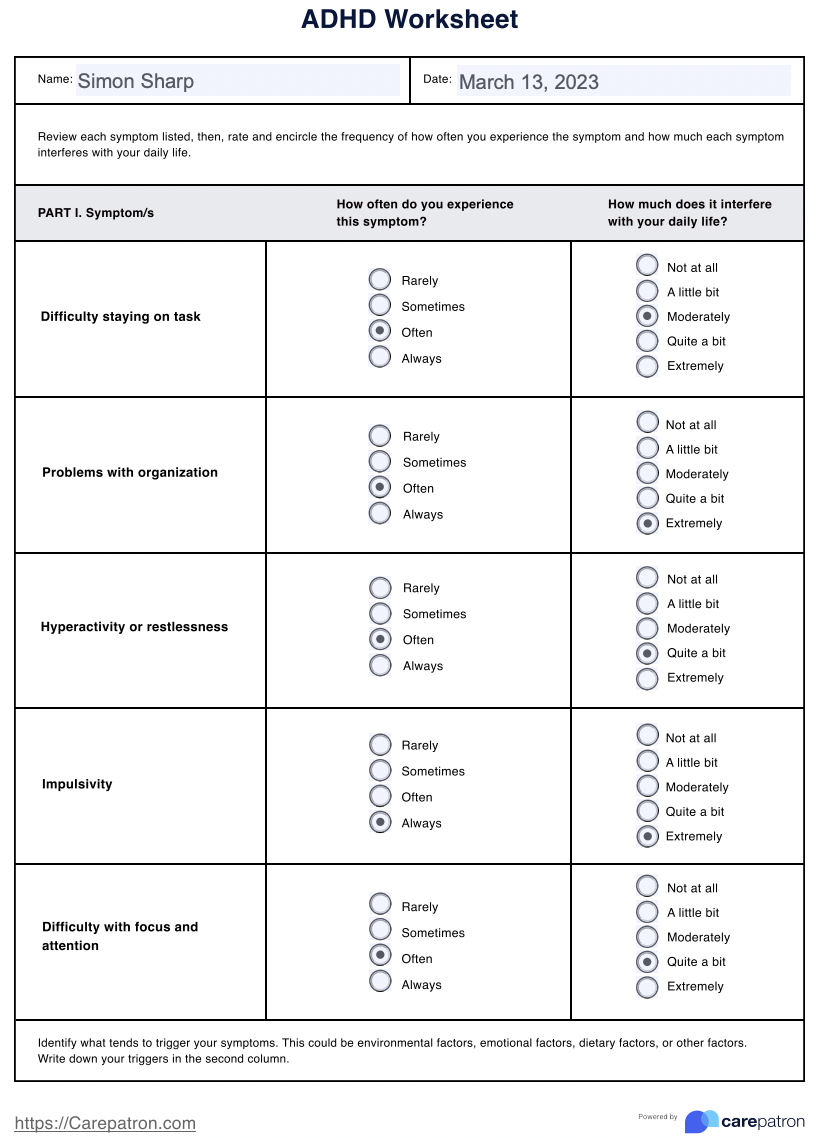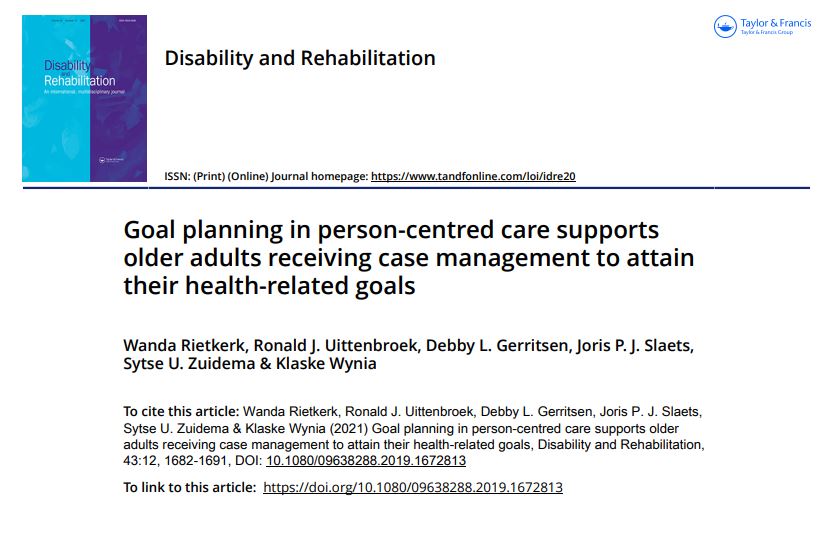What To Do If You Suspect Adult ADHD

Table of Contents
Recognizing the Signs of Adult ADHD
Recognizing the signs of Adult ADHD is the first crucial step. While symptoms often present differently in adults than in children, the core challenges remain.
Common Symptoms in Adults
Adult ADHD symptoms often manifest as difficulties with focus, organization, and emotional regulation. Unlike children, who may exhibit hyperactivity through constant movement, adults might experience internal restlessness or struggle with sustained attention to tasks. Common symptoms include:
- Difficulty focusing: Struggling to concentrate on tasks, easily distracted by external stimuli, and experiencing mind wandering.
- Forgetfulness: Frequently misplacing items, forgetting appointments or deadlines, and experiencing significant memory lapses.
- Disorganization: Difficulty with planning and prioritizing tasks, struggling to maintain a clean and organized workspace or living environment.
- Restlessness: Feeling internally agitated or restless, even when physically inactive. This can manifest as fidgeting or pacing.
- Impulsiveness: Acting without thinking, making rash decisions, interrupting others frequently, or engaging in risky behaviors.
- Difficulty with time management: Chronic lateness, procrastination, and trouble estimating how long tasks will take.
- Emotional dysregulation: Experiencing intense emotional reactions, difficulty managing frustration or anger, and mood swings.
Differentiating ADHD from Other Conditions
It's important to remember that many conditions share symptoms with ADHD. Anxiety, depression, and learning disabilities can all present with similar challenges. Overlapping symptoms include difficulties with concentration, focus, and emotional regulation.
- Anxiety: Often presents with restlessness, difficulty concentrating, and irritability, which can overlap significantly with ADHD symptoms.
- Depression: Can lead to decreased motivation, difficulty concentrating, and fatigue, mimicking some ADHD symptoms.
- Learning Disabilities: Can cause difficulties with specific academic skills, impacting organization and concentration, which might be mistaken for ADHD.
A comprehensive evaluation by a healthcare professional is essential to differentiate ADHD from other conditions and obtain an accurate diagnosis.
Seeking Professional Help for Adult ADHD
Once you suspect you might have Adult ADHD, seeking professional help is crucial for accurate diagnosis and effective treatment.
Finding the Right Healthcare Provider
Several healthcare professionals can diagnose and treat ADHD. Choosing the right one depends on your individual needs and preferences.
- Psychiatrists: Medical doctors specializing in mental health; they can prescribe medication.
- Psychologists: Specialists in mental health who can provide therapy and conduct comprehensive assessments.
- Clinical Psychologists: Similar to psychologists, but with a focus on diagnosis and treatment of mental health conditions.
- ADHD-specialised therapists: Therapists specializing in evidence-based ADHD treatment.
Consider factors such as insurance coverage, provider experience with adult ADHD, and your comfort level with different treatment approaches when choosing a provider.
The Diagnostic Process
Getting a diagnosis typically involves several steps:
- Self-reporting questionnaires: Completing questionnaires that assess ADHD symptoms and their impact on your life.
- Clinical interviews: Discussions with a healthcare professional about your symptoms, medical history, and daily challenges.
- Neuropsychological testing (optional): Tests that measure cognitive functions like attention, memory, and executive functions. This is not always necessary for diagnosis but can be helpful in understanding the specific cognitive strengths and weaknesses associated with ADHD.
Honest self-reflection during the diagnostic process is essential for an accurate assessment.
Treatment Options for Adult ADHD
Several treatment options are available for Adult ADHD, and a combination of approaches often proves most effective.
- Medication: Stimulant and non-stimulant medications can help improve focus, reduce impulsivity, and improve overall functioning.
- Therapy (e.g., Cognitive Behavioral Therapy - CBT): Teaches coping mechanisms and strategies to manage symptoms, such as time management and organizational skills.
- Lifestyle changes: Regular exercise, a balanced diet, sufficient sleep, and stress management techniques can significantly improve ADHD symptoms.
Coping Strategies and Support for Adult ADHD
Managing Adult ADHD effectively involves a combination of professional treatment and self-help strategies.
Lifestyle Adjustments
Implementing practical strategies can make a significant difference in managing daily challenges.
- Time management techniques: Utilize planners, calendars, and time-blocking techniques to organize your schedule and prioritize tasks.
- Organizational tools: Employ tools like to-do lists, digital organizers, and label makers to maintain order and reduce clutter. Apps like Todoist, Remember The Milk, and Trello can be beneficial.
- Stress management strategies: Practice relaxation techniques like mindfulness, yoga, or meditation to reduce stress and improve focus.
Support Groups and Communities
Connecting with others who understand the challenges of living with ADHD can provide valuable support and encouragement.
- Online forums: Participate in online communities dedicated to ADHD, sharing experiences and seeking advice from others. CHADD (Children and Adults with Attention-Deficit/Hyperactivity Disorder) is a valuable resource.
- Support groups: Join local support groups for adults with ADHD to connect with others facing similar challenges.
- Organizations offering resources: Numerous organizations provide valuable information, support, and resources for adults with ADHD.
Advocating for Yourself
Learning to advocate for your needs is crucial in managing ADHD effectively in all areas of your life.
- Communicating your needs effectively: Learn how to explain your challenges to employers, family, and friends in a clear and concise manner.
- Accessing accommodations: Explore options for workplace accommodations, such as flexible work schedules or assistive technology, to support your success.
Conclusion
Suspecting you have Adult ADHD can be overwhelming, but taking proactive steps towards diagnosis and treatment is crucial. By understanding the symptoms, seeking professional help, and exploring various coping strategies, you can effectively manage your symptoms and improve your quality of life. Don’t hesitate—take the first step towards understanding and managing your Adult ADHD today. Find a qualified professional to discuss your concerns and begin your journey towards a better understanding of your condition and how to manage it. Remember, seeking help for Adult ADHD is a sign of strength, not weakness.

Featured Posts
-
 Fatal Boat Ferry Collision In Clearwater Florida Multiple Injuries Reported
Apr 29, 2025
Fatal Boat Ferry Collision In Clearwater Florida Multiple Injuries Reported
Apr 29, 2025 -
 Georgia Traffic Stop Turns Deadly Deputy Killed Another Wounded
Apr 29, 2025
Georgia Traffic Stop Turns Deadly Deputy Killed Another Wounded
Apr 29, 2025 -
 Understanding The Risks Research On Driving Safety For People With Adhd
Apr 29, 2025
Understanding The Risks Research On Driving Safety For People With Adhd
Apr 29, 2025 -
 Older Adults And You Tube A New Era Of Television Viewing
Apr 29, 2025
Older Adults And You Tube A New Era Of Television Viewing
Apr 29, 2025 -
 Nintendos Action Leads To Ryujinx Emulator Development Cease
Apr 29, 2025
Nintendos Action Leads To Ryujinx Emulator Development Cease
Apr 29, 2025
